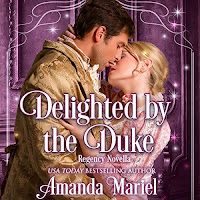 Delighted by the Duke by Amanda Mariel.
Delighted by the Duke by Amanda Mariel.My rating: 2 of 5 stars ⭐⭐
Duration: 1 hr 39 mins.
#BennetSistersScale: Jane - 🌹🌹🌹🌹 Such a sweet tale has to be a Jane, but it lacks her grace.
Delighted by the Duke, Fabled Love Book 4 by Amanda Mariel is a very short but ever-so sweet romance inspired by the Regency era. It is not fate which throws Emma Baxter into the path of a widowed Duke, but Emma herself, when she stows away in his carriage...
Audible Summary: "Miss Emma Baxter stowed away in a carriage in order to escape her uncle and the baron he's bent on forcing her to marry. The last thing she expected was to find herself with the Duke of Radcliffe, Aaron St. John, and his ten year old daughter, Lady Sophia. Now she faces an entirely different danger.
As I pressed play on this book I was looking forward to a short, lightweight listen with a happy ending that would transport me to the comforting predictability of the English Regency. Such books have been my go-to when I'm tired or unwell for as long as I can recall, and novellas can be perfect for such days because they provide instant gratification. One of the things I find most soothing is the familiarity of the era, having read and researched it so frequently over the years. Unfortunately, this does mean that when an audiobook plays a little fast-and-loose with the historical record, it stands out like Mr Darcy reaching for a smartphone during the Netherfield ball. Such was the case here.
Early on in this audiobook our heroine, Emma Baxter, and her Uncle refer to the drinking establishment they run as the "pub", which would have been uncommon in the Regency period. Whilst there are several possible alternatives, it generally followed that inns or coaching inns provided lodgings as well as refreshment, with taverns and (in particular) alehouses being more common names for those which were simply purveyors of alcohol. 'Alehouse' was being replaced by 'public house' in the 19th Century, but its abbreviated form is uncommon in literature until a bit later. Though it is of course normally the case that words enter colloquial conversation a while before they are recorded in print (unless you're William Shakespeare), it's very unusual to hear 'pub' used in a Regency novel.
Even more jarring was the Duke's daughter, Lady Sophia, (whose age is 7-10 depending on whether you go by the story or the synopsis) referring to her "Momma" in a very modern, Americanised fashion, and the similarly-Transatlantic use of "frosting" for the cake icing.
It is also interesting to note that the "three tiered" wedding cake described in this audiobook would, most likely, not have been more than a single tier. Nor would it have been covered in soft icing of the sort a heroine could swipe her finger through as Emma does. Bride cakes were built to last, with the ability to send portions to absent friends and family; a tradition which continued in some form well into the 20th Century, where it was common for a smaller upper tier of the now-larger cakes to be saved and used at the Christening of the couple's first child. Buttercream would survive neither the post nor a pregnancy! Much more common throughout the Georgian period were hardened sugar icings and baked meringue-style coverings, such as those detailed by Elizabeth Raffald in her book The Experienced English Housekeeper, 1794, which features in this fascinating article on the subject by JaneAusten.co.uk.
The author also appears to awkwardly misuse the word "smirk" with surprising frequency for a book of such brevity. It is usual for a 'smirk' to be a rather smug, self-satisfied expression but it is used in this audiobook for any small smile. For example, the phrase "she gave a sympathetic smirk" feels contradictory, as a smirk conveys conceit, not empathy.
These distractions, and others, meant that this story did occasionally feel a bit like a Regency parody, peppered with lots of additional 'Britishisms' to give it authenticity. The phrase "Daddy, do say she can stay. Please? Pretty please with crumpets on top!" probably feels delightfully British to a foreign audience, but just made me think of more recent works such as The Famous Five, or Jenny Agutter in The Railway Children.
In many ways, I think this story would have worked far better as a 1930s novel than it does as a Regency. The anachronistic elements and exaggerated linguistic style would have been better suited to a more contemporary setting, albeit one in which class and breeding were still key to one's fate. It's a very sweet idea with a lot of promise, but lacks care in its execution.
Short stories are always a tricky format to do well as each sentence has an important role, and they leave the author nowhere to hide. To engage an audience they must really pack a punch despite their limited duration. I did enjoy the premise of this audiobook, and think that had it been longer then I could have come to like the protagonists and care very much for the future of this charming little family. It has the makings of a good story, but is too thin in its current form to do the idea justice. To this end, I found the characters a little shallow; Emma's turmoil is never explored in enough detail to really connect us with her perilous position. Surely being sold twice by two men who should have cared for her would have made her mistrustful and guarded? Yet Emma welcomes the Duke's sudden advances without hesitation, despite the vulnerability of her position. The Duke's character is defined almost solely by fatherhood, (something most Dukes would not have concerned themselves with in such a hands-on fashion), and we are given very little information about his background, or even much on his appearance.
Their first kiss also occurs rather too abruptly for my tastes. I prefer the connection to be a little more established, feeling the attraction between a couple build. If there is to be an 'instant' passion then their mutual desire should be more prominent and consuming from the off.
Overall this is a very sweet, clean, Regency-inspired short story. It is not historically accurate enough to be a true Regency, but is still a nice, somewhat Disneyfied little story with pleasant characters. I'd listen to other short audiobooks by Amanda Mariel, but the lack of research might become irksome in a full-length story if it is typical of her style.
The narrator, Anne Marie Damman, performs this audiobook nicely but her accent is very put-on, and though I am unfamiliar with her other books I'm inclined to think that her usual dialect is American. Words like "calm", "palm", "office", and "often" seldom sound natural when an American narrator is using an English accent, and they are amongst the most noticeable tells in this audiobook too. Despite the accent feeling a little over-acted, she has a pleasant voice and gives her male characters depth which is never easy. Baron Wyndham was especially lecherous and a made for a wholly unattractive and quite sinister prospect. She also handled the singing well, which would have been doubly difficult in a non-native accent. Her voice reminds me of Lark Rise to Candleford's Ruby Bentall at times.
Though it will not suit purists at all, I would recommend this to people who are just looking for a sweet, sentimental, fairytale-style romance with a Regency flourish, which they can listen to from beginning to end over a pot of tea or relaxing in the bath.
*I received this audiobook free of charge in exchange for an honest, unbiased review.
(Click here to buy this book, listen to a sample, or add it to your wishlist!)












No comments